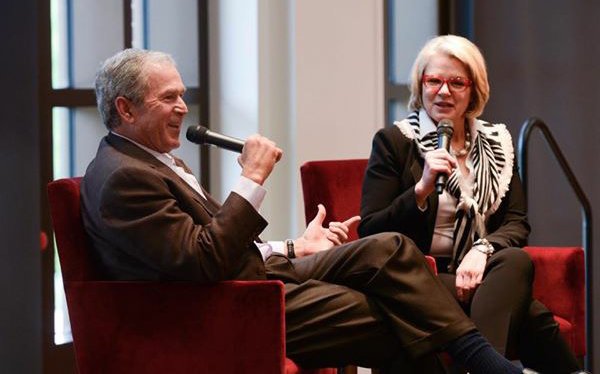Feature photo: President Bush and former Secretary of Education, Margaret Spellings, engaged in a candid Q&A with #PLScholars at Presidential Leadership Scholars Session 3 [Photo by Grant Miller]
Last Saturday, I completed Session 3 of the Presidential Leadership Scholars (PLS) Program in Dallas, Texas at the Bush Center. The team at PLS continues to deliver – creating an unprecedented learning environment with access to former Presidents, their Administrations and world-renowned academics. I continue to be blown away by the opportunity to participate in this program.
The topic of focus for Session 3 was decision-making. We were afforded access to information detailing the decision-making process for some of the toughest decisions that were made by the Bush Administration. Dr. Condoleezza Rice shared insights on tough foreign policy decisions – everything from the war in Iraq to relations with Russia. Former Secretary Hank Paulson shared about the myriad challenges he faced as he and his team tried to prevent the country from descending into a second depression in 2008. President Bush candidly shared his thoughts on leadership, crisis decision-making, and the importance of building strong, transparent relationships as a leader. All in all, it was very rich learning environment that challenged my thinking and helped me identify ways in which I can grow to better serve my organization and our farmers.
Here are my top takeaways about decision-making from Session 3:
- Job Description: Judgment and decision-making is the core of a leader’s job.
- Prevent Groupthink. If there is too much quick consensus about an important decision and time allows, question it. Kick the crap out of your idea – go around and have everyone create one argument against your agreed-upon course of action.
- Focus on key decisions. As a leader, you need policies to prevent you from having to make a lot of small, mundane decisions because this creates decision fatigue. You need to be able to focus on only the most critical decisions.
- Build trust. Transparency around the process of decision-making builds trust. You must have a very transparent process in place because people will hold the leader more accountable and will be tougher on you.
- Don’t lose the forest for the trees. Leaders must think strategically and then act tactically.
- Get all the information on the table. Build teams that encourage all members to speak up and contribute, so that when decision are made, the team has all the information they need to make well-informed decisions.
- Know what you don’t know; and then surround yourself by good people who help you fill in your gaps.
- A firm foundation is critical. Establish a set of values and principles for yourselves that will not change, and build your decision-making process on that bedrock.
- Recognition and blame. Give others credit when things go well, and take the heat yourself when things go badly.
- It’s not about you. Culture is important. Build a culture for your team, and make sure that culture is not about you.
Three PLS sessions down, three to go! More to come.


